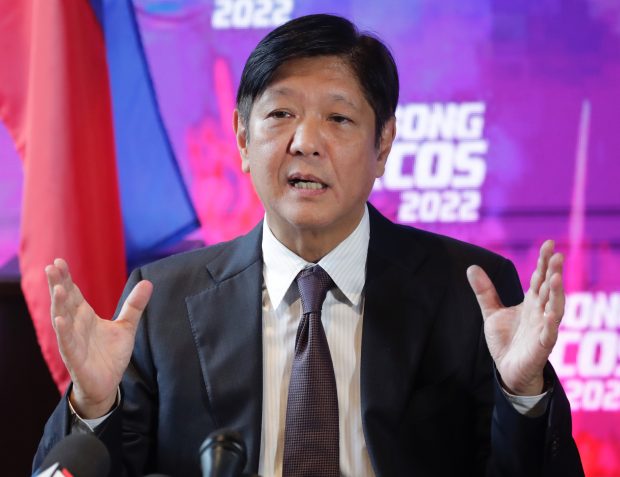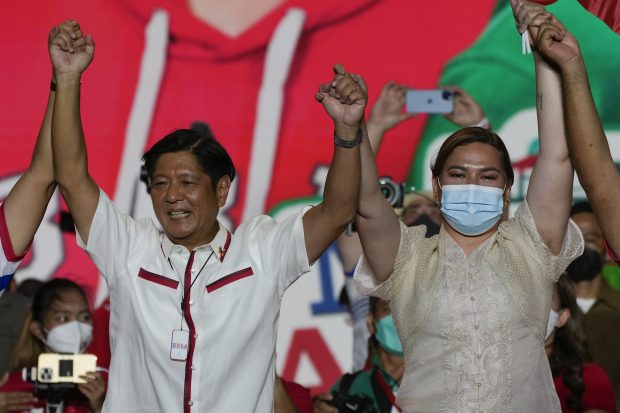필리핀 대선, 마르코스 봉봉 주니어가 압승 거둔 이유

*아시아엔 해외필진 기고문을 한글번역본과 원문을 함께 게재합니다.
[아시아엔=알린 페레 필리핀 ‘온타겟미디어콘셉트’ 기자] 2022년 5월 9일 필리핀 대선이 치러졌다. 그 결과를 놓고 많은 이들이 충격적이었다고 하지만, 이는 순화된 표현에 지나지 않는다.
12명의 새로운 상원의원과 하원의원을 비롯해 시도 단위 지방 선거도 마무리됐다. 물론 가장 큰 관심은 대통령과 부통령 선거에 쏠렸다. 이들은 2028년까지 6년간 필리핀을 이끌어 갈 예정이다.
경쟁자 레니 로브레도의 2배 가량인 3100만표를 얻으며 압승을 거둔 이는 1986년 피플 파워 봉기 당시 축출된 독재자 페르디난드 마르코스의 아들 페르디난드 ‘봉봉’ 마르코스 주니어다. ‘피플 파워’로부터 35년이 지난 지금, 마르코스 일가는 대통령 관저 말라카낭 궁으로 돌아갈 준비를 하고 있다.
마르코스 주니어는 ‘통합’이라는 메시지로 지지자들에 어필했다. 그는 선거 기간 동안 강력한 결집력을 바탕으로 경제 발전을 이끌 것이라고 약속했고, 국민들에게 자신과 부통령 후보를 지지해달라 호소했다. 그의 러닝메이트이기도 했던 부통령 후보는 현재 로드리고 두테르테 대통령의 딸 사라 두테르테다.

지지층 결집이 불러온 시너지
마르코스 주니어와 사라 두테르테는 이번 대선을 치르며 양쪽 가문의 전통적인 지지층을 결집시키는 전략을 세웠다. 마르코스 주니어는 마르코스 가문의 북부 지방, 사라는 민다나오 섬과 비사야스 섬에서 강력한 지지 기반을 확보해 둔 상태였다. 사라 두테르테의 대통령 출마설이 돌던 1년 전 여론조사에서 마르코스 주니어는 27%, 사라 두테르테는 24%의 지지율을 기록한 바 있다. 이들이 지난해 10월 대통령-부통령 러닝메이트로 출마선언을 한 이후 지지율은 55-60%대로 급등했으며, 그 추세는 꺾이지 않았다.
중요한 사실은 부정선거 의혹에도 불구하고- 하지만 실제로 선거법 위반 사례는 발견되지 않았다- 이들이 3100만표를 얻으며 압도적인 승리를 거뒀다는 것이다. 필리핀 대선에서 과반수 이상의 지지를 얻은 것은 1986년 이후 처음이다.
권력의 말 뿐인 약속에 지친 빈곤층
일부의 주장처럼 마르코스 주니어 득표의 약 10%가 조작되었다고 하더라도 투표수로 환산해도 310만표에 지나지 않는다. 5백만표가 부정투표라 가정해도 마르코스 주니어의 승리 자체를 뒤집기는 어렵다.
필리핀의 일부 평론가들은 이번 선거 결과에 대해 “대중의 보복 심리가 낳은 것”이라고 지적한다. 1986년 이후 필리핀 정치인들은 부정부패 척결, 사회 변혁, 정부의 과감한 지원책 등을 약속했지만 이를 지킨 정부는 없었다. 빈곤층은 그런 정치권력에 지쳐버렸다. 하위계층 대부분은 마르코스 주니어가 독재자 마르코스의 ‘황금시대’를 부활시킬 수 있다고 믿는 듯하다.
마르코스 가문을 미화한 소셜미디어
또다른 이들은 마르코스 주니어의 압도적인 승리가 소셜미디어의 승리라고도 말한다. 10년 이상 활성화돼 온 소셜미디어가 선거 결과에 큰 영향을 미쳤다는 주장이다. 이에 대해 마르코스 주니어 측이 역사를 임의로 수정하고 또 배포했다는 주장도 있다. 페이스북, 유튜브 등을 적극적으로 활용해 계엄령과 독재 논란이 있었던 마르코스 가문에 다른 색을 덧칠했다는 것이다. 일부 역사학자들도 마르코스 주니어 캠프에 대해 허위사실을 토대로 선거운동을 벌였다고 지적했다.
대중의 반응도 극과 극이다. 마르코스 가문에 반대했던 젊은이들이나 계엄령에서 살아남은 이들은 충격에 빠졌고, 그들 중 일부는 소수이긴 하지만 트라우마 증상을 보이기도 했다. 마르코스에 대항하는 ‘핑크 운동’을 지지했던 젊은 층은 그들의 부모 세대에게 ‘탈세로 유죄 판결을 받은 범죄자가 어떻게 대통령이 될 수 있냐’며 불신을 토로했다.
반면 승자를 지지했던 이들은 마르코스 주니어의 승리를 인정하고 “필리핀이 이제 앞으로 나아가야 하며, 그에게 기회를 줘야 한다”고 말한다. 아버지와 아들은 다르며, 3,100만명의 유권자가 그를 지지했다는 것이 그들의 주장이다.
필리핀이 2022년 5월 9일 돌이킬 수 없는 큰 실수를 저질렀는지, 아니면 올바른 정치적 선택을 했는지는 역사가 판단할 것이다.
Reflections on Philippine Elections
by Alin Ferrer-Garganera / Media practitioner, radio anchor, Philippines
We just concluded the national elections in the Philippines last May 9, 2022, and the results are in. To say it was shocking to many would be an understatement.
Twelve new senators have been proclaimed. Almost 90% of the House of Representatives have also been declared as winners. The local elections for provincial and municipal government officials have also been concluded.
But it’s the race for the Presidential and Vice-Presidential positions that is the most anticipated. Possibly before the end of May, the new President and Vice-President will be proclaimed as well, and they will have a new mandate to lead the country for six years, until 2028.
The presumptive President is Ferdinand “Bong Bong” Marcos, Jr., son of the former dictator Ferdinand Marcos who was ousted during the People Power uprising in 1986. More than 35 years later, the Marcos family is poised to return to Malacanang Palace, the Presidential residence. Marcos, Jr. is on his way to a landslide victory, garnering 31 million votes.
His closest rival, Leni Robredo, could only muster a little over 14 million votes.
Marcos Jr. rallied his supporters with the message of “Unity”, even baptizing their electoral slate as the “UniTeam”. He promised during the campaign period that his central thrust of unity will usher in economic development, and he asked people to trust him and his Vice-President that they will deliver. His choice for Vice-President is Sarah Duterte, the daughter of outgoing president Rodrigo Duterte.
Their tandem is actually a practical case of unity. Marcos Jr. was relying on the votes of the “solid north”, the bailiwick of the Marcoses. Meanwhile, Sara was bringing in the votes from Mindanao and Visayas. A year ago, Marcos Jr., was polling at around 27% on the presidential surveys, while Sarah Duterte was at around 24%. When they merged last October and declared their partnership, their survey polls surged to around 55%-60%, and they never looked back.
Political analysists and election experts have given their analysis of what happened, and they presented valuable lessons for Philippine politicians and for the general public. The most important observation I can make is that despite the allegations of electoral fraud (there are no Philippine elections were fraud and electoral violations are not present), no one can take away the fact that Marcos Jr. earned a fresh mandate. 31 million votes are clear mandate. And it is the first time since 1986 that a majority vote has elected a president.
Now, even assuming that 10% of the votes were rigged or a result of fraud, that only translates to about 3.1 million votes that Marcos, Jr. may have illegally acquired. Even if we put it at 5 million votes, that is not enough to question the results, Marcos Jr. won against the seemingly very popular Pink Movement led by Leni Robredo. Even if we switch all the 5 million votes from Marcos Jr. to Leni Robredo, Marcos is the winner.
Some analysts point out that this is revenge vote of the masses. The poor or those who belong to the lower social classes, or the D and E classes in the social stratification measurements. Poor people have grown tired of traditional politicians promising change and less corruption and more government services since 1986, but no government has delivered. So it seems that most poor people believe that Marcos Jr. can bring back the alleged “Golden Age” of Martial Law that the elder Marcos brought in.
Others insist that this shocking win for Marcos Jr. was a result of more than two decades of rebranding and re-education of the Filipinos via social media. Others have blatantly called this historical revisionism, with the aggressive use of social media such as Facebook and YouTube to paint a totally different picture of Martial Law and the Marcos family. Some historians and fact-checkers have even labeled the Marcos campaign as part of an organized misinformation and disinformation campaign.
Reactions of the general public have been polarized as well. On one hand, young opposers or Marcos and those who survived Martial Law are in shock, some even have been their traumas triggered. A huge young population who immersed themselves in the “Pink Movement” against Marcos are left jaded and in disbelief, asking their parents how could a convicted criminal and tax evader become President?
Meanwhile, on the victor’s side, their key messages are to “move on” and accept a Marcos win, and to “give Marcos a chance”. They claim that the son is not the same as the father, and that he and his 31 million voters deserve a chance.
History will judge if the Filipinos made the biggest blunder or the right political choice last May 9, 2022. I am eagerly waiting for the next chapter. We are just coming to the exciting part.
For me and my family, our conscience is clear. We supported, campaigned and voted for the person we sincerely believed was the right one to lead the Philippine nation.





